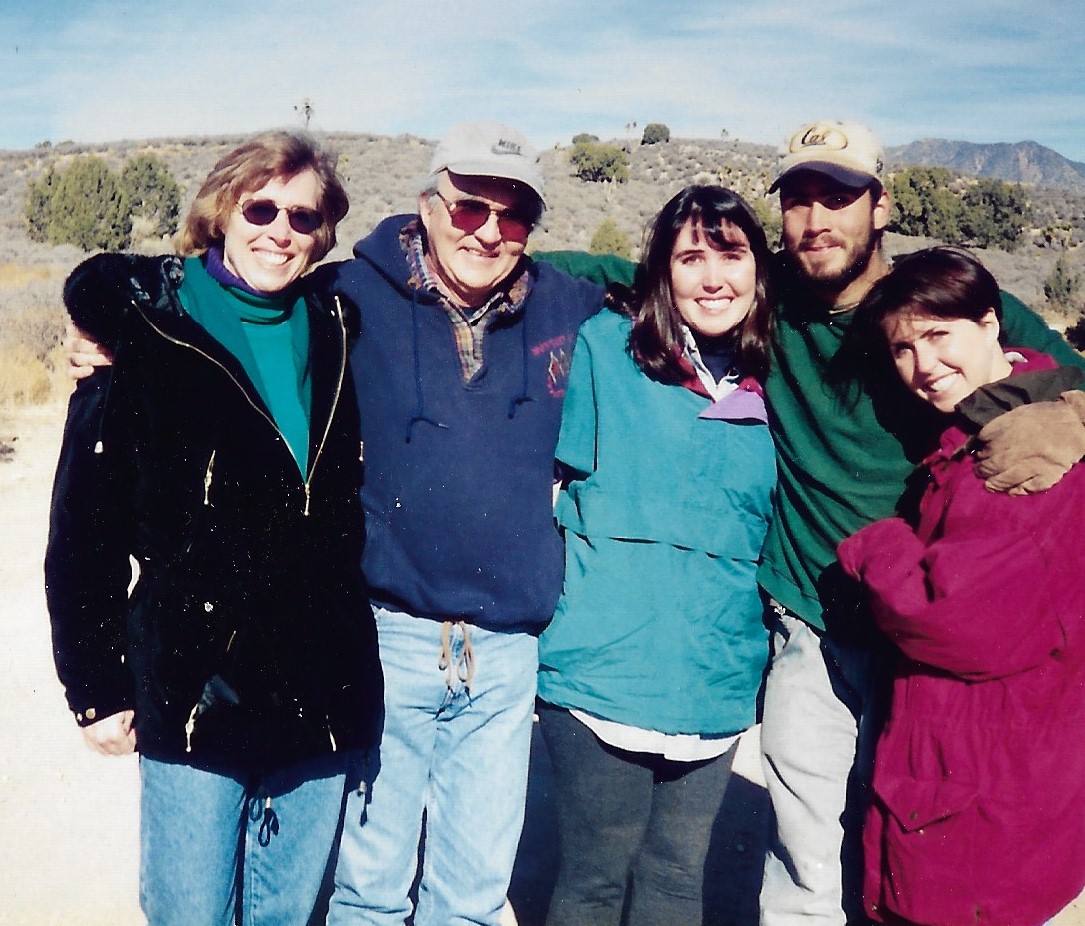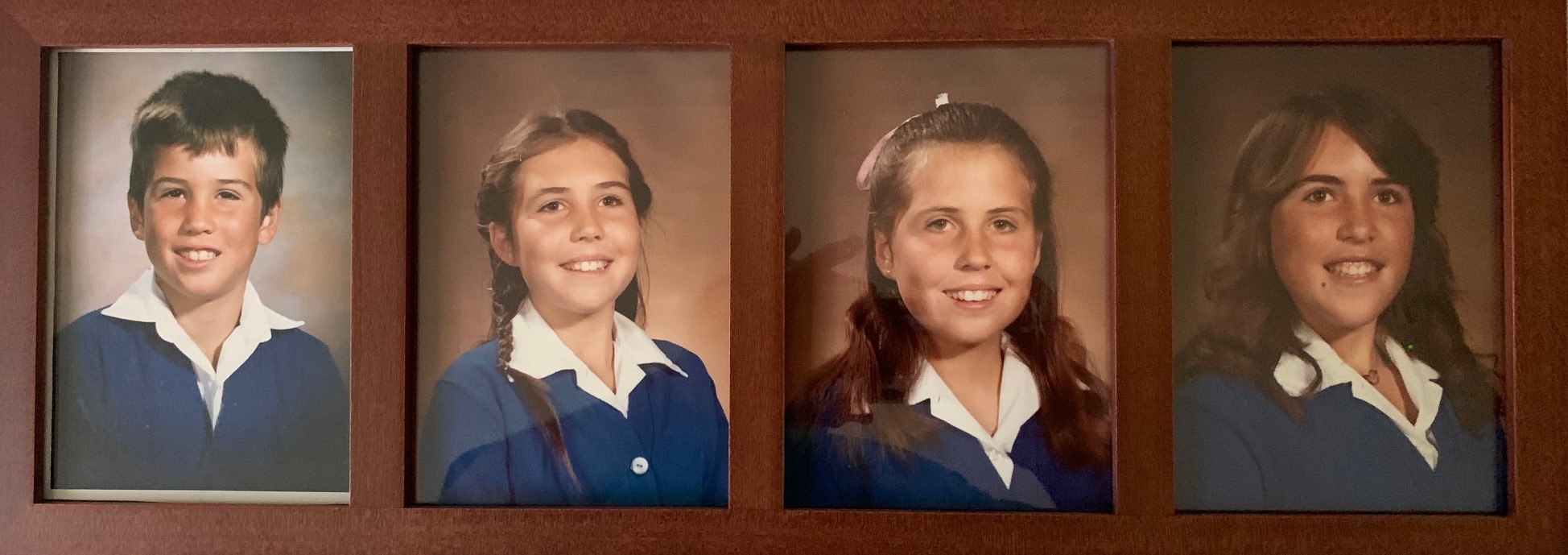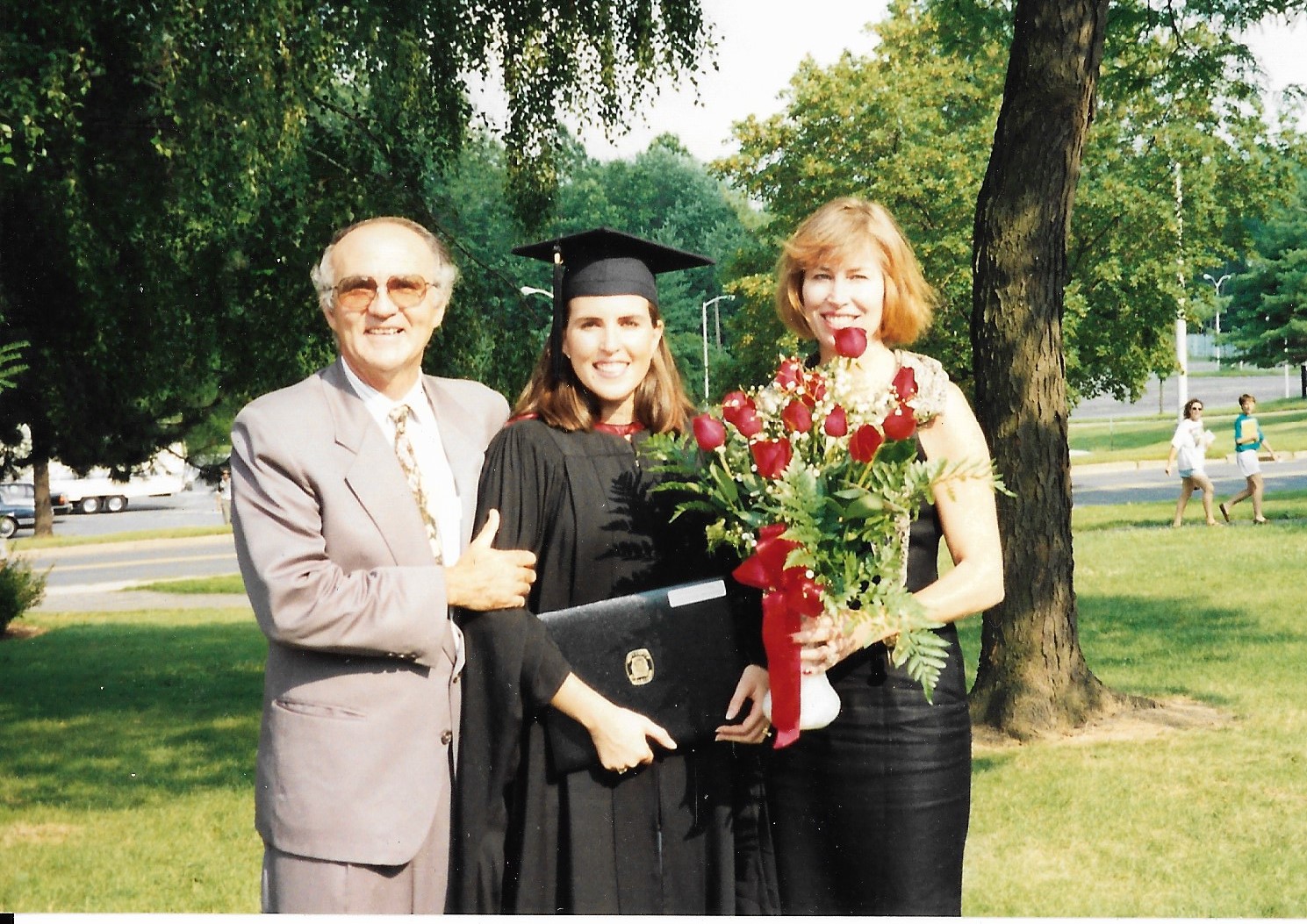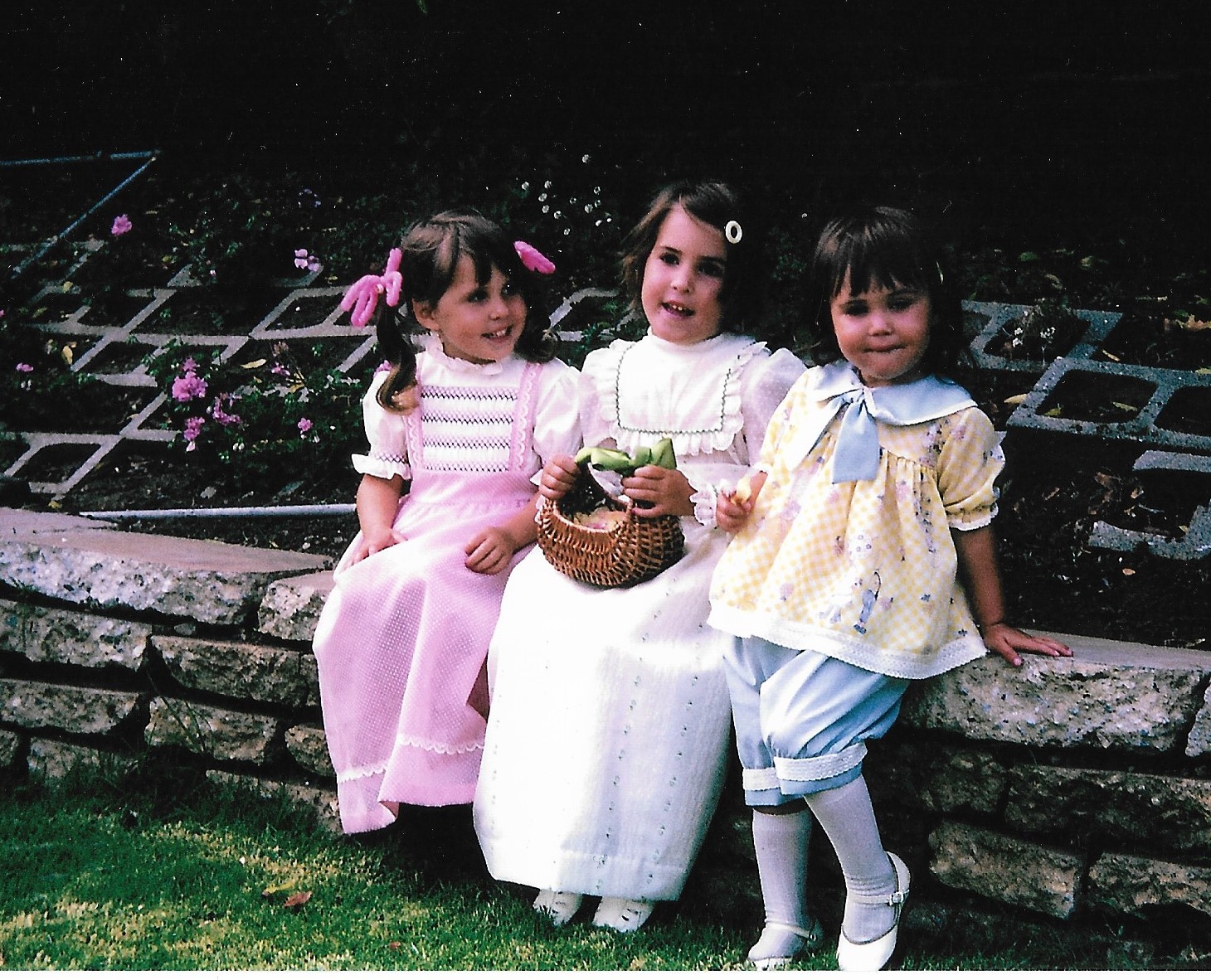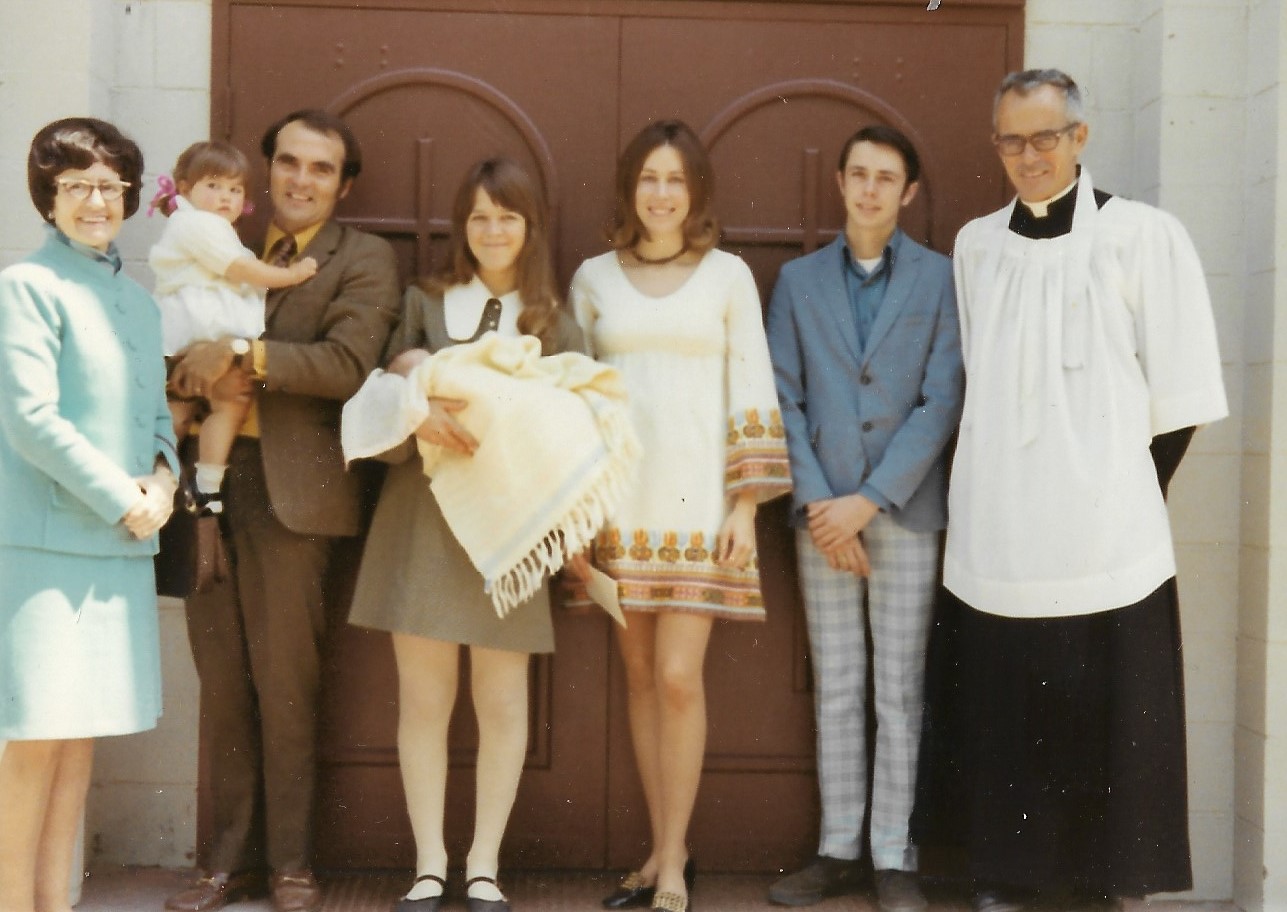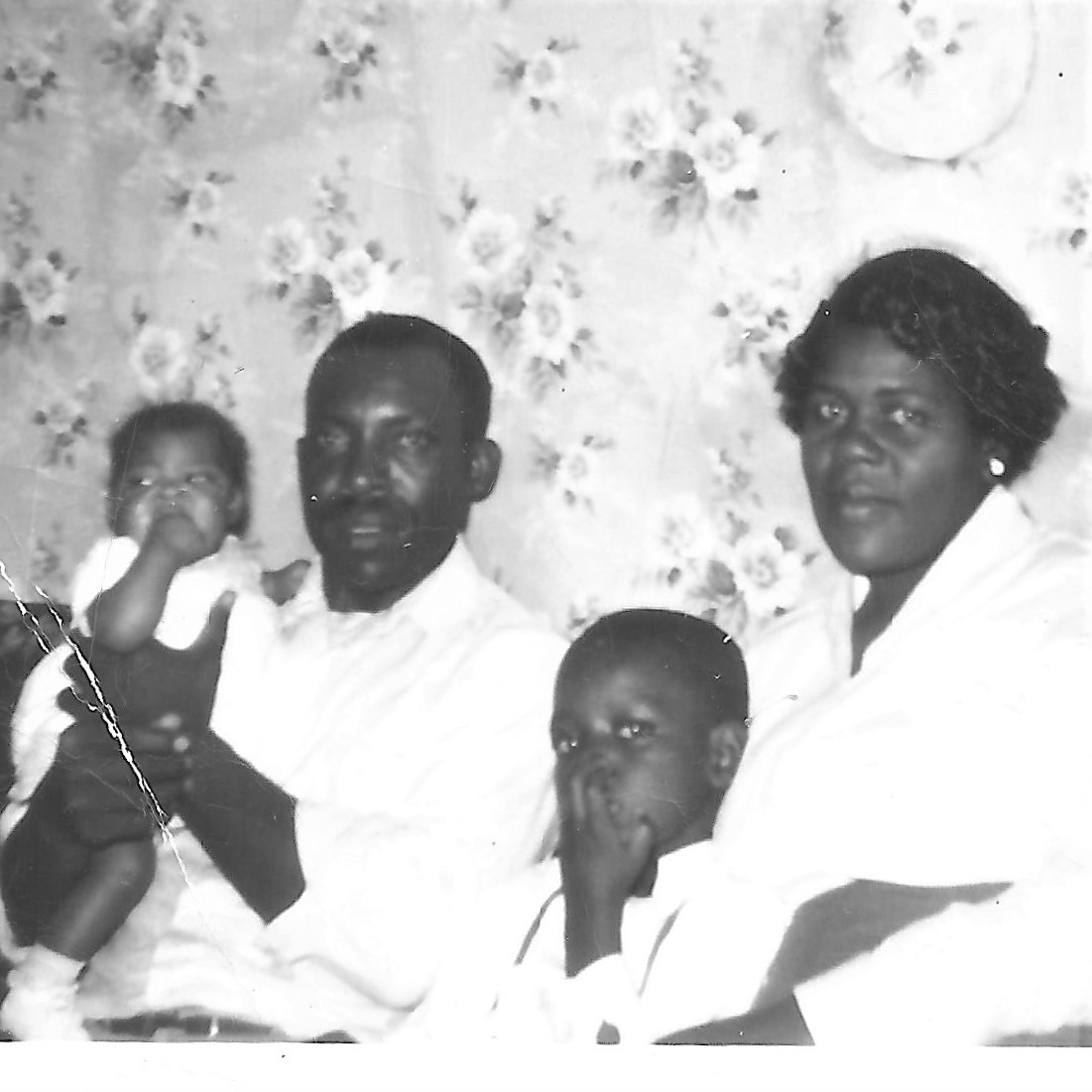My Mother, Lucille Smith, was born on April 26, 1926, in Lee Hall, Virginia, the youngest of nine children born to Jane and Moses Smith.
My Father, Edward Lee Vernon, Sr., his family called him “Bubba.” Momma and his friends called him Ed Lee, born on January 17, 1919, in Grafton, VA. The oldest of six children to Simuel Haywood and Martha Ellen Vernon.
My Mother and Father married on December 8, 1940, in Yorktown, Virginia. My parents lived with her parents in Lee Hall during the early years of their marriage. They also lived with his grandparents at some time in their marriage. Daddy grew up living with his grandparents, Simuel Vernon Sr. and Jane (Foster) Vernon; Foster is her maiden name. They had eight children. Barbara Yvonne, Martha Jane, Christine Elizabeth, Esther Mae, Elnora Bernetta, Lucille, Edward Lee Jr., and Deborah Juanita.
I was too young to remember moving from my grandparent’s home in Lee Hall to Newsome Park, but I remember asking to go back to see Aunt Mamie. Momma was so surprised that I remembered and wanted to go back. I also remember the trips back (up home) that is what we called our Mother’s childhood home. Even as a child, I loved to travel, and whenever we would go, I would be so excited. Sometimes Esther, our cousin, would go with us, and my sisters and I had to stand in the back of the car. No laws back then that made us buckle up. I remember that sometimes the bottom of my feet would burn. It was mainly a two-lane country road with trees and farms back then. It was only about 25 miles, but it was a long drive for a kid standing in the back of a car.
Momma would always say if we wasted food or anything, “Y’all gonna put us in the Poor House.” As a kid, I thought the Poor House was a real place; as we drove “up home,” we would pass old houses that needed painting, sometimes old barns looking like they would fall. I thought that must be the “Poor House” that Momma talked about. Still, today, when I see an old house along the highway, I think of the Poor House. Momma always tried to make it fun for us, and she would pack a lunch. Sometimes, we would find just the right spot to stop and eat picnic-style. There were no restaurants where Black people could stop and eat back then. I know they almost certainly did not have money to buy food from a restaurant.
Another thing that I remember my Mother saying is, “If all of our problems were hung on a line, you would take yours, and I would take mine.” That has stayed with me. I think of it often when I am going through a storm. Everyone has problems; yours are not as bad as you think; look at what others are going through.
Christmas was always lots of fun at our house. Momma would hide our gifts and then put them out late on Christmas Eve; we kids would have a hard time going to sleep on Christmas Eve, even though we would go to bed before it got dark. Our cousin Esther would come to the house and pretend to be Santa, and we would all run to our room. I don’t know about the rest of my sisters, but I believed in Santa until I was about 12; Momma had to tell me about Santa. (SMILE)
No matter how little they had, they ensured we had a wonderful Christmas morning. My sisters and I would wake up early to see what Santa had left us. Momma did not wrap our gifts; we would start looking and touching stuff. Then Momma and Daddy would come in and hand out our gifts. Every year I wanted a bicycle; I don’t remember asking for one; I don’t remember seeing Santa and telling him I wanted a bike. I just thought Santa knew it, but I never got one.
One of us would always get sick on Christmas morning. We would start eating candy and fruit before breakfast; Momma soon stopped that and made sure we all ate breakfast first, not so much candy. Sometimes, because my birthday is in December, I would get an extra gift if they did not get me anything on my birthday. Now I DO NOT wait for Christmas to get my Birthday gift.
As far as my childhood goes, we were happy kids, sheltered and protected, and we were never hungry or homeless. Sometimes we had syrup and biscuits for dinner because that was all we had, and I could tell Momma felt terrible, but that was fine with me; I have always had a sweet tooth. Sometimes now, I will put syrup on a biscuit, which brings back memories. While the words I love you are not a large part of my memory, we were good. We were poor, but we didn’t know it then, and we felt loved; we had a home full of love and felt safe. I had two parents and several siblings, and the world was fair for me then. There were six of us girls, but we also would have some of our cousins or friends come over to spend the night on the weekend. Momma never said no, and she enjoyed having the extra kids there. Momma was very serious and always kept things under control. But Daddy was the enforcer, and he kept us in line.
Daddy was always right there with Momma. He was a loving father and husband; I never saw him and Mom argue or fight. I know one time she had him running out of the house. I was too young to understand what that was all about.
Daddy had a sense of humor; he would tell a joke or two, but not so much, around us. I overheard him telling jokes at our cousin Esther’s house one night. I will never forget him as my protector; he would do anything for our family. He was well-liked in the neighborhood with lots of friends. He always smiled as he greeted people asking, “how’s it going?” Our friends would come over, and he would take us places if we had a car. He never met a stranger. I remember he would say to people who asked him if all of us girls were his, he would say, “that’s what my wife says” I didn’t understand that answer until I became an adult.
Momma and Daddy both were very close to Esther Turner, our cousins. We lived right across the street from her, but she would soon become more of a grandmother than a cousin. Esther and Momma were first cousins; their mothers were sisters, and they were very close.
Christine and I were both really afraid of dogs. One evening, we came home from Esther’s house, and we saw a big dog, and we started to scream and run. Daddy heard us, and Momma said he didn’t take the time to unhook the screen door. He just smashed through it to get to us. That is the way he was when we were kids. When I was a small child, I always loved when Daddy picked me up; it felt like I could see everything.
Once, we went to the beach or a Carnival. I was young, maybe six or seven. Daddy took me for a ride in the Bumper Cars; even though I held on to him, I was not afraid. I can’t remember being afraid of anything when he was around.
Daddy taught me how to drive; I did not pass the test the first time I tried for my license; I failed the parallel parking. He took me to the school parking lot, put down two boards, and parked the car. First with me inside the car and then standing outside, so I could see what he was doing. He got out and told me to park. The year was 1958; no power steering, no power, anything. I was trying to get that car between those two boards as best I could. He was outside beating on the front of the car and saying, TURN IT, TURN IT; we did that for several days. The next time I tried for my license, I passed the parking test. He also warned me not to CUT The CORNER when making a left turn. Do you know what that means? Most people don’t because they do it every time; they make a left turn. Cutting the corner is when you make that left turn. Instead of going to the right of the lane, most people turn on the edge of the lane and “cut the corner” of the lane belonging to the vehicles coming towards them.
I can hear him saying it today when I make a left turn. “Don’t Cut That Corner.” He also warned me about the Red Light; do not take off as soon as the light turns green. Someone may be running the Red Light. Better to give them the right of way than to be broadsided. Funny how some things stay with you.
Daddy worked at the Shipyard for a long time. Then he got hired at (VEPCO) Virginia Electric & Power Company. He was working there when he got sick. After Daddy became ill, things changed. One day he came in, and he could hardly walk. I never knew what was wrong with him, and he ended up in the hospital. The doctors did not understand what was wrong with him. Daddy was in the hospital for quite a while. They strapped him onto a unique bed; the whole bed would turn entirely over, and he lay there, facing the floor for a time. I never knew what that was about and how it helped his condition. When he came home, he still could not walk. He was angry and upset about his situation and could not work. He would yell, banging his walking cane on the coffee table, and he only wanted Momma to take care of him. My sisters and I attempted to do all we could manage, we were very young, and Momma was working two jobs and not well herself.
Momma and Daddy both worked very hard before her death and his illness. These are some of the jobs I remember her doing. Day Work: Back then, Black women had several White families; they cleaned for and got paid daily. Port Arthur Chinese Restaurant, she worked in the kitchen. She would bring food home, which was a good thing; they had delicious Chinese food. Sometimes, Barbara or I would go with her to help cut up vegetables.
When she became ill, she worked at Mary Immaculate Hospital as a Nurse Aide and drove a school bus. While working as a Nurse’s Aide, she worked 12-hour shifts. She would be at the hospital at night from 7 pm to 7 am and then drive the school bus in the mornings when she got off from the hospital. She would try and sleep whenever she could. Then around three or so, she would go back to the school bus, do her rounds, get home, try to nap, and then go back to the hospital at 7 pm. I don’t think it ever occurred to her to ask for help (welfare).
Momma and Daddy lacked no effort in trying to keep things going. With his illness, children, and trying to finish the house, there was no place in time for her to become ill. When I was about 15, Momma hit her upper leg on the corner of a table. It bruised, and a lump came that did not go away. She went to the hospital, and they removed the lump and found Cancer cells. The Doctors told her they had removed all of the Cancer. Everything was so different back in the ’50s. She started having all kinds of problems, not feeling good, and pain in her back. The Doctors once again said it was from working so hard and having eight children so close.
She could not stop working and worked two jobs with great pain in her back. In 1960 she went from Doctor to doctor, trying to find the problem. Finally, one Doctor had an x-ray done with dye injected into her spine. This procedure showed shadows in several places on her spine. These shadows turned out to be malignant tumors which they did not know until after the surgery. The Doctor told Mom and Dad that surgery was the only way to find out what was showing on the X-ray. The surgery did not go well; she lost too much blood and died during the operation on October 6, 1960, at the Mary Immaculate Hospital in Newport News, Virginia, at thirty-four. The doctors had told them the surgery was very dangerous, working on the spine; she could become paralyzed or lose her life. She had a 50/50 chance.
As we left the hospital that night before, I still hear her saying, “See Y’all in the morning.”
I have tried to give you a little insight into my Mother and what I know about those thirty-four years before her death. I was so shocked and sad I thought I would never breathe again. That was the end of life as I knew it; I became a real grown-up at seventeen that day.
As you can imagine, Daddy did not do well after Momma died. He never got over her death. Daddy had not recovered from his illness, but he could walk. Daddy was still in treatment and never returned to work; he was on disability for the rest of his life. He went to several different hospitals for treatments in and around the area; he stayed at the house (614) for a while; he never married again.
The three youngest went to live with Steen and Uncle John in Baltimore. The rest of us just existed until each of us stepped out on our own journeys, with the help of Esther, Steen, and Uncle John, into our adult life.
My Mother, Lucille Smith, was the youngest of nine children born to Jane and Moses Smith. She had three sisters, Mary known as Mamie. Cuttie, who spent her entire adult life in a mental institution, and Elnora, who died at eighteen from Tuberculosis.
Aunt Mamie is the oldest child, the aunt we were closest to; she was like a grandmother to us. She lived on the land given to her by her father (Poppa), Grandpa Moses, which he obtained when they left Mulberry Island. I will tell you more about the land and Mulberry Island when I get to my Maternal Grandparents.
Aunt Mamie married Alexander Mason; they had two children, Evoria and James. Momma was younger than her nephew James. Growing up with him and his sister Evoria, she started to call Uncle Alex daddy as her niece and nephew did. They told her he was not her Daddy, and she insisted he was, and as time went on, she started calling him “My Daddy.” He was her sister’s husband, her brother-in-law, but she called him MY Daddy until he died.
My sisters and I would spend the summer with Aunt Mamie, and Evoria would make us play outside. We had to sit on a blanket under a tree in the yard. If we needed to go to the bathroom, we used the outhouse; if we wanted water, we pumped it from the well in the back of the house. Aunt Mamie was an excellent cook and would fix us delicious lunches and dinners. A screened-in porch wrapped around two sides of the house; sometimes, we slept out there. I remember looking up at the white clouds in the blue sky as we took a nap during the day. My sisters and I still have a wonderful relationship with Evoria today. We consider her one of the “sisters”; she is only ten years older than me. Her birthday is December 1, and mine is December 14. I loved going “up-home,” as we called it. After moving back from Baltimore, I lived with Aunt Mamie for a short time in the ’70s. Aunt Mamie lived her entire life in Lee Hall on Taliaferro Rd. Her daughter Evoria took her to Philadelphia to live with her when she became ill. Aunt Mamie was born on October 16, 1906, and died on March 14, 1994, at 88.
Aunt Cuttie. For as long as I can remember, Aunt Cuttie had been in the Central State Hospital in Petersburg, VA. It was essential to my Mother that we visit her. We would make the trip from Newport News to Petersburg several times a year. I heard many stories as a child about why Aunt Cuttie was in a mental hospital, but I do not know if they are true. When we visited her, she neither talked nor communicated in any way. She would stare at you, and I always felt she wanted to say something. Then she was moved to Eastern State Hospital in Williamsburg, VA., a little closer to Newport News. After Momma died, Uncle John took over being responsible for her. When he died, Steen, Uncle John’s wife, asked Barbara, my oldest sister, to take over the responsibility since Steen lived in Baltimore, MD. Barbara lived in Hampton, VA, which is closer to Williamsburg. What stands out to me is a picture of Aunt Cuttie at 87, with a head full of snowy silver hair. I am 77, and my hair is almost as white; I am about 95% gray. I think a full head of gray hair is a family trait. Poppa was gray, and I started to turn gray when I was 19. Aunt Cuttie was born on October 6, 1913, and died on November 15, 2002, at 87.
Aunt Elnora is the only sister that left Virginia. I remember a conversation with Momma; she told me that Aunt Elnora had moved away; I think it was New York. It seems like most Black Youths went North during those times. Momma told me that her sister, Elnora, had promised to return and get her when she got older and take her to New York. Momma had looked forward to going to New York to live with her sister. She would not get this opportunity because when her sister, Elnora, returned home, she was sick with Tuberculosis, known as TB, a death sentence back then. She died on November 16, 1937, at 18.
Momma had six brothers, Uncles Clarence, Moses, Sam, John, Alexander (Alex), and Joseph, who died at eight months old from Whooping cough. I knew all these uncles, except Joseph, as I grew up. We only had a close relationship with Uncle John. They all loved their baby sister dearly and would do anything for her. All but Uncle Clarence left Virginia as soon as they were old enough to join the Military and never returned home to live.
Uncle Clarence and his wife, Harriet, we called her Aunt Hattie, lived in Newport News. They had eight children. Uncle Clarence was a half-brother; his Mother’s name was Dollie, she died in a boating accident, and Poppa married my Grandmother Jane Boykins. They lived on the land on Taliaferro Road until their deaths. Their youngest son Joseph moved his family to the original Smith land and built a home. I am not sure if it was before or after Poppa died that Joseph moved there. Uncle Clarence was born on December 22, 1895, and died on October 21, 1971, at 76. Aunt Hattie was born on January 3, 1899, and died on September 15, 1986, at 87.
Uncle Moses moved to Philadelphia, PA, where he worked in the coal mines. He moved to Baltimore, MD; as a young adult, he did not serve in the Military. Uncle Moses was married to Elizabeth Lacey, and they had four children. He also had two other wives and children. Uncle Moses lived in the third-floor apartment in the three-story house on Park Avenue, which Steen and Uncle John owned. I got to know him when I lived in Baltimore with Steen & Uncle John. Uncle Moses was born May 10, 1909, and died in February 1972 at 63.
Uncle Sam was in the Navy and the Reserve for 20 years. He settled in Baltimore, MD, and married Celia Lawrence; they had six children; they called each other Mr. and Mrs. Smith; they did not use their first names. Uncle Sam was born on March 14, 1911, and died on December 21, 1987, at 76.
Uncle John also served in the Navy. He lived in Chicago, where he met and married Ernestine Cora Marshall on March 10, 1956. They moved to Baltimore, where Uncle John worked and retired from the Bethlehem Steel Corporation. Uncle John and Steen had no children but became so intently intertwined in our lives after Momma died; they touched us to our Souls. Uncle John was born on October 6, 1915, and died on Thursday, November 26, 1998, at 83. Steen was born on November 21, 1924, and died on June 5, 2015, at 91.
Uncle Alex also served in the Navy; he lived in Philadelphia, Pa. As far as I know, he never married or had children. Uncle Alex would come to visit every couple of years or so. What I remember most about him is that he liked to see us compete. He would have a bag full of change, throw it up in the air, and we would scramble for it; whoever got the most coins would get a dollar. Uncle Alex would always take Momma grocery shopping, and we would have so much food. He always gave Momma money and brought her the only set of wedding rings she ever had. He also gave her the money for me to register for college. Uncle Alex was born on July 8, 1921and died January 9, 1980, at 59.
That was a brief overview of my Mother’s family…
The Vernon’s
My Father, Edward Lee Vernon, Sr., the oldest of six children, had three sisters, Mae Ellen, Carrie Elizabeth, and Alice Marie. I had an excellent relationship with these aunts after I became an adult. They were not in my life as I was growing up.
Aunt Mae married Horace Taliaferro; they had five children; they spent over 20 years in the Army and lived most of the time in Texas. I was closest to Aunt Mae when Uncle Horace retired from the Army and they returned to Virginia. I was living on Taliaferro’s Rd with Aunt Mamie. We developed a close relationship, and she ran a daycare. She helped me so much with Karen, and she also babysat Lonnie. She and Uncle Horace stood with me each time I married, and she gave me so much motherly advice. Aunt Mae was born on December 28, 1922, and died at her home in Newport News, VA, on March 11, 2008, at 86.
Aunt Carrie was the motherly type. I remember talking to her about family and trying to get some background on Daddy’s side of the family. Even after Momma died, I did not know the Vernon family as we grew up. Christine developed a close relationship with Aunt Carrie. She did give me more information on the Vernons than anyone else. Aunt Carrie married Julius Ralph Miles, and they had five children in a blended family. They lived in Grafton, VA, right down the street from our grandparents. Aunt Carrie was born on September 14, 1927, and died on August 23, 2015.
Aunt Alice had twins, Jimmy and Joan, and I remember it was a delightful family event in the family. I remember Momma and Daddy getting us ready to visit them at our grandparent’s house. Aunt Alice was married to James Robert Griffin, the twin’s father, and later to James Robert Armstead, whom we called Mr. Armstead. I did not have a personal relationship with either of these uncles-in-law. As I developed a relationship with Aunt Mae, I also got to know Aunt Alice better.
Over the years, we have become very close and can talk on the phone for hours. Aunt Alice was always very serious; there were many rules when visiting her home. I love her sense of humor and her logic of right and wrong. I admire her style and taste; we both like the same type of fashion. She has a way of doing things, which she expects when you’re there. I like staying with her because you always know what to expect and feel welcome. I enjoyed staying at her house when I lived in Alaska and came home on work trips.
I remember coming home after surgery for Breast Cancer. I came to John Hopkins Hospital in Baltimore for a second opinion. I spent some time with Steen and Uncle John. I came home to Newport News to see everyone before returning to Alaska. I stopped by Aunt Alice’s house; she fixed me lunch. We had a pleasant visit talking, then she asked for my keys. I was a little surprised, but being always taught to respect my elders. (Parents used to teach that) I gave her my keys. She said you are going to take a break and stay here today. You should rest. I took a nap in her back bedroom, and I will never forget that day. It rained and thundered. I slept for quite a while. I had not experienced a thunderstorm in a long time. You don’t get thunderstorms like that in Fairbanks, Alaska. I forgot how much I missed them. That was the best nap I have ever had. I did need the rest. I stayed overnight with her. Thanks, Aunt Alice. I appreciate the excellent relationship I have with her today.
Today, Aunt Alice is 90 years old (DOB 11/6/1930) and in good health and mind, and her son Jimmy lives with her at her home on Crafford Rd in Newport News, VA.
NOTE: James (Jimmy Jam) Robert Griffin, Jr., 73, of Newport News, VA, passed away Friday, February 17, 2023. James leaves to mourn their loss, his mother, Alice Vernon Armstead, sister, Joan Griffin Tucker (Lloyd), Uncle William Haywood Vernon (Lorraine), and a multitude of cousins and friends. A celebration of his life will be held at a later date (to be announced). Published by Daily Press on Mar. 2, 2023
Daddy had two brothers, William Haywood, and Wardell Nathanial.
Uncle Haywood is the oldest of the two younger brothers in the family. Uncle Haywood is only about 11 years older than I am. When you are a child, people seem so much older than you; ten years is a lot when you are ten years old.
I was old enough to remember when Uncle Haywood and Aunt Lorraine got married, and Daddy was the best man at their wedding. I believe Uncle Haywood was close to his big brother. He and Aunt Lorraine spent more time with us than the rest of the family after Momma died. Uncle Haywood and Aunt Lorraine were more involved in our lives. They came to the house often to check in on us—a close relationship developed with Esther Mae, which is still very close today. Uncle Haywood can tell some good jokes, always smiling and happy, with something funny to say whenever we see him. Since I moved back to Virginia, I have had the opportunity to spend more time with him and Aunt Lorraine.
Uncle Haywood and Aunt Lorraine lived in Germany for a few years with his job working for (AAFES) Army and Air Force Exchange Service. They also lived in a couple of other states before returning to Virginia. When they returned, they soon got back in with family functions, and until just a couple of years ago, there would always be a big Father’s Day Bash at their house. I remember walking past him at a Father’s Day celebration, and I said, “Hi, Uncle Dad,” because he had taken on the Dad role so many times. I could see the joy on his face in that big smile as he passed by; he liked that. Aunt Lorraine has always been right there with him smiling and softly encouraging us along the way. As I look back, I say thanks to you both. As we got older, Christine, Esther Mae, and I all found a close relationship with one of Daddy’s siblings. The ones that went to live in Baltimore never did. Today 9/8/2020, Uncle Haywood is 87 years old (4/18/1933) and is our only living Uncle. Aunt Lorraine is 84 years old (1/26/1936). They are still very active, drive all over, are happy, and live in her hometown of Poquoson, VA.
Wardell Nathanial was the youngest of Daddy’s brothers. We never called him Uncle; he was just Wardell or (Ward). He moved to Philadelphia. He didn’t come home often, as far as I know, and when he did, it was only for special occasions, family reunions, and funerals, and he did not stay long. He was the biggest jokester in the family. He always had something funny to say. I did not spend much time with him during his in and out visits. As far as I know, he never brought home any family, even though he had a family in Philadelphia. I did find a picture of him and a young lady at the family reunion in 1987; I have no idea who she is. I have contacted some of his family members in Philadelphia on Facebook and Ancestry. I don’t know if they are his children or grandchildren, but I have not developed a relationship. I do remember he was always “Kool.” Wardell was born on September 30, 1935, and died on November 3, 2001.
That is a brief overview of my Dad’s sisters and brothers.
Daddy died of Lung Cancer on August 22, 1983, 24 years after Momma died, in Newport News, VA, at 64, one year after I moved to Alaska with my new husband.

